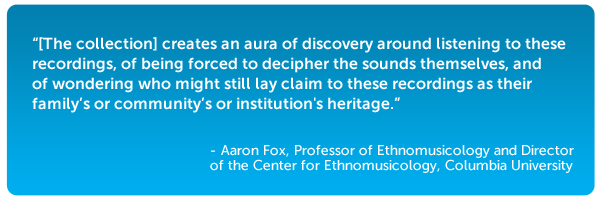Ethnographic Sound Archives Online
Ethnographic Sound Archives Online brings together previously unpublished historic audio recordings and their supporting field materials, opening new paths for the study of music in its cultural context.
The collection brings together 2,000 hours of audio recordings from field expeditions around the world, particularly from the 1960s through the 1980s—the dawn of ethnomusicology as a codified discipline.
Building on their predecessors’ early sound collecting methods, ethnomusicologists began to fill in gaps on the world music map, traveling to field sites to record and document music in its broader cultural context. These collectors’ bodies of work contain some of the most comprehensive surveys of regional music on record, including Mark Slobin’s survey of Afghan music, Nazir Jairazbhoy’s survey of classical Indian music, and Hugh Tracey’s survey of southern and central African music.
The practice of going into the field to “collect” music dates to the early 20th century, as innovations like the portable phonograph enabled sounds to be recorded on wax cylinders. In response to a growing commercialized music industry, and tied to the Romantic Era notion of disappearing cultures, early field workers such as Frances Densmore and Alan Lomax traveled to remote areas to document and preserve everyday songs and language. By the 1960s, sound collectors began incorporating theories and methods from cultural anthropology—and ethnomusicology as an academic field of study was born.
Curation
Music is tightly woven into society and culture — it accompanies rituals and dances, and fills social spaces. It is the goal of the ethnomusicologist to document sound in this broader context, so field recordings are often accompanied by film footage, photographs, handwritten notes, and records of the larger soundscape. Where possible, the audio in this collection is presented along with its contextual materials, totaling more than 10,000 pages of field notes and 150 hours of film footage, re-creating music’s relationship to its cultural context in a digital space.
Featured Archives
The Mark Slobin Fieldwork Archive, Music in the Afghan North, 1967-1972 (World Music Archives, Wesleyan University)
One of only four Western music scholars allowed into Afghanistan in the late 1960s, Mark Slobin's body of work is a comprehensive documentation of music, culture, language, and society in the Afghan North. Completed less than a year before the Soviet invasion of Afghanistan and subsequent anti-musical Taliban takeover, the historical significance of this project lies not only in its comprehensive coverage of the musical landscape of the region, but in its "time capsule" nature. No further musical, and by extension cultural, studies have been undertaken since, given the region's volatile unrest. Learn More about Slobin's archive in this recent blog post from Wesleyan University. The full repository of Mark Slobin's field research in Afghanistan, including field recordings from his survey of music in the Afghan north along with contextualizing field notes, photographs, film footage, and background text.
The Nazir Ali Jairazhboy Archive (The Archives and Research Center for Ethnomusicology, American Institute of Indian Studies)
Curated selections from Nazir Ali Jairazhboy's lifelong research documenting the diversity of musical styles and genres across India and Pakistan. His field recordings represent one of the most comprehensive surveys of Indian music taken in the second half of the 20th century, and builds on the foundational research laid by Arnold Bake in the 1930s. Selections include Jairazbhoy's Bake 1938-39 restudy, along with contextualizing field notes, diaries and text.
The Sound of Africa Series (International Library of African Music, Rhodes University)
The Sounds of Africa series is the most comprehensive collection of field recordings from Central, Eastern and Southern Africa, a vast survey of musical genres and cultures. Hugh Tracey began studying African music in 1921, when he arrived from Devonshire, England in Southern Rhodesia (now Zimbabwe). He soon developed a love for their music and was convinced of the enormous value of music in their lives. Almost immediately, however, he became aware of the resistance of the colonial community, in particular those in education, the church and government, to any suggestion that Africans had any culture or music that was worthwhile. He knew from personal experience that this attitude was mistaken, and this was the trigger for his life’s work. Presented in original finding aid order, each recording is accompanied by Tracey's original handwritten field notes and field data.
The U.S.A. South Negro Folklore Collection, Music from the American South (Center for Ethnomusicology, Columbia University)
This historically significant collection documents African American music and language in the Jim Crow South, with a focus on urban communities rarely documented at the time. Recorded by Walter Garwick between 1935-1937, the collection includes spirituals, hymns, and gospel music; Gullah prayers, sermons, tales, Br'er Rabbit stories, and vendors' street cries; spells, remedies, and tales; dialect and folk plays; and some secular and children's songs. In its geographic diversity and range of musical and rhetorical idioms, this collection provides a strikingly different perspective on the sound of the African American south than other field recordists of the same era.

Already a subscriber? Start exploring now.
Or, complete the form below for your free 30-day access to Ethnographic Sound Archives Online.



